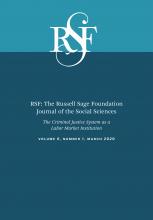Research Article
Open Access
Providing After Prison: Nonresident Fathers’ Formal and Informal Contributions to Children
Allison Dwyer Emory, Lenna Nepomnyaschy, Maureen R. Waller, Daniel P. Miller, Alexandra Haralampoudis
RSF: The Russell Sage Foundation Journal of the Social Sciences March 2020, 6 (1) 84-112; DOI: https://doi.org/10.7758/RSF.2020.6.1.04
Allison Dwyer Emory
aAssistant professor in the Department of Sociology at the University at Buffalo
Lenna Nepomnyaschy
bAssociate professor at the Rutgers School of Social Work
Maureen R. Waller
cAssociate professor in the Department of Policy Analysis and Management at Cornell University
Daniel P. Miller
dAssociate professor at the Boston University School of Social Work
Alexandra Haralampoudis
ePhD candidate at the Rutgers School of Social Work

REFERENCES
- ↵
- Administration for Children and Families (ACF)
- ↵
- Agan, Amanda, and
- Sonja Starr
- ↵
- Apel, Robert, and
- Julie Horney
- ↵
- Atkinson, Daryl V., and
- Kathleen Lockwood
- ↵
- Avery, Beth
- ↵
- Berracasa, Colenn,
- Alexis Estevez,
- Charlotte Nugent,
- Kelly Roesing, and
- Jerry Wei
- ↵
- Bureau of Labor Statistics (BLS 2018)
- ↵
- Cancian, Maria,
- Carolyn J. Heinrich, and
- Yiyoon Chung
- ↵
- ↵
- Carson, E. Ann, and
- Joseph Mulako-Wangota
- ↵
- Coltrane, Scott,
- Ross D. Parke, and
- Michele Adams
- ↵
- Cozzolino, Elizabeth
- ↵
- D’Alessio, Stewart J.,
- Lisa Stolzenberg, and
- Jamie L. Flexon
- ↵
- DeFina, Robert H., and
- Lance Hannon
- ↵
- Denver, Megan,
- Garima Siwach, and
- Shawn Buschway
- ↵
- Dickman, Scott J
- ↵
- Doleac, Jennifer L., and
- Benjamin Hasen
- ↵
- Dwyer Emory, Allison
- ↵
- Edin, Kathryn, and
- Laura Lein
- ↵
- Edin, Kathryn, and
- Timothy J. Nelson
- ↵
- Farrington, David P
- ↵
- Federal Bureau of Investigation (FBI)
- ↵
- Finlay, Keith
- ↵
- ↵
- Geller, Amanda,
- Carey E. Cooper,
- Irwin Garfinkel,
- Ofira Schwartz-Soicher, and
- Ronald B. Mincy
- ↵
- Geller, Amanda,
- Irwin Garfinkel, and
- Bruce Western
- ↵
- Glaze, Laren E., and
- Laura M. Maruschak
- ↵
- Hamer, Jennifer
- ↵
- Hlavka, Heather R.,
- Darren Wheelock, and
- Jennifer E. Cossyleon
- ↵
- Jacobs, James B
- ↵
- Jarrett, Robin L., and
- Linda M. Burton
- ↵
- Kane, Jennifer B.,
- Timothy J. Nelson, and
- Kathryn Edin
- ↵
- ↵
- ↵
- ↵
- ↵
- Legal Action Center
- ↵
- Legal Action Center
- ↵
- McLanahan, Sara
- ↵
- ↵
- McLeod, Branden A., and
- Aaron Gottlieb
- ↵
- ↵
- Mincy, Ronald B.,
- Daniel P. Miller, and
- Elia De la Cruz Toledo
- ↵
- Naft, Michael, and
- Geraldine Downey
- ↵
- Nepomnyaschy, Lenna
- ↵
- ↵
- Nepomnyaschy, Lenna,
- Daniel P. Miller,
- Steven Garasky, and
- Neha Nanda
- ↵
- ↵
- Pager, Devah
- ↵
- Pager, Devah,
- Bruce Western, and
- Naomi Sugie
- ↵
- Pate, David J
- ↵
- Pettit, Becky, and
- Christopher J. Lyons
- ↵
- Pettit, Becky, and
- Christopher J. Lyons
- ↵
- Pew Charitable Trusts
- ↵
- Reichman, Nancy E.,
- Julien O. Teitler,
- Irwin Garfinkel, and
- Sara S. McLanahan
- ↵
- Rodriquez, Michelle Natividad
- ↵
- ↵
- Roy, Kevin, and
- Linda Burton
- ↵
- Roy, Kevin, and
- Omari Dyson
- ↵
- Sariscsany, Laurel,
- Irwin Garfinkel, and
- Lenna Nepomnyaschy
- ↵
- ↵
- ↵
- ↵
- Sorensen, Elaine,
- Liliana Sousa, and
- Simone Schaner
- ↵
- Spaulding, Shayne,
- Robert I. Lerman,
- Harry J. Holzer, and
- Lauren Eyster
- ↵
- Stack, Carol B
- ↵
- Sugie, Naomi F
- ↵
- Swisher, Raymond R., and
- Maureen R. Waller
- ↵
- Sykes, Bryan L., and
- Amanda Geller
- ↵
- ↵
- Turner, Kimberly J., and
- Maureen R. Waller
- ↵
- Turney, Kristin, and
- Christopher Wildeman
- ↵
- Uggen, Christopher
- ↵
- Uggen, Christopher,
- Mike Vuolo,
- Sarah Lageson,
- Ebony Ruhland, and
- Hilary K. Whitham
- ↵
- University of Kentucky Center for Poverty Research
- ↵
- Vuolo, Mike,
- Sarah Lageson, and
- Christopher Uggen
- ↵
- Waller, Maureen R
- ↵
- Waller, Maureen R
- ↵
- Waller, Maureen R.,
- Allison Dwyer Emory, and
- Elise Paul
- ↵
- Waller, Maureen R., and
- Robert Plotnick
- ↵
- ↵
- Warner, Cody,
- Joshua Kaiser, and
- Jason N. Houle
- ↵
- Washington, Heather M.,
- Shao-Chiu Juan, and
- Anna R. Haskins
- ↵
- Weiss, Yoram, and
- Robert J. Willis
- ↵
- Western, Bruce
- ↵
- Western, Bruce,
- Leonard M. Lopoo, and
- Sara McLanahan
- ↵
- ↵
- Western, Bruce, and
- Natalie Smith
- ↵
- Western, Bruce, and
- Christopher Wildeman
- ↵
- Wildeman, Christopher
- ↵
- ↵
In this issue
Providing After Prison: Nonresident Fathers’ Formal and Informal Contributions to Children
Allison Dwyer Emory, Lenna Nepomnyaschy, Maureen R. Waller, Daniel P. Miller, Alexandra Haralampoudis
RSF: The Russell Sage Foundation Journal of the Social Sciences Mar 2020, 6 (1) 84-112; DOI: 10.7758/RSF.2020.6.1.04
Providing After Prison: Nonresident Fathers’ Formal and Informal Contributions to Children
Allison Dwyer Emory, Lenna Nepomnyaschy, Maureen R. Waller, Daniel P. Miller, Alexandra Haralampoudis
RSF: The Russell Sage Foundation Journal of the Social Sciences Mar 2020, 6 (1) 84-112; DOI: 10.7758/RSF.2020.6.1.04
Jump to section
Related Articles
- No related articles found.
Cited By...
- No citing articles found.





